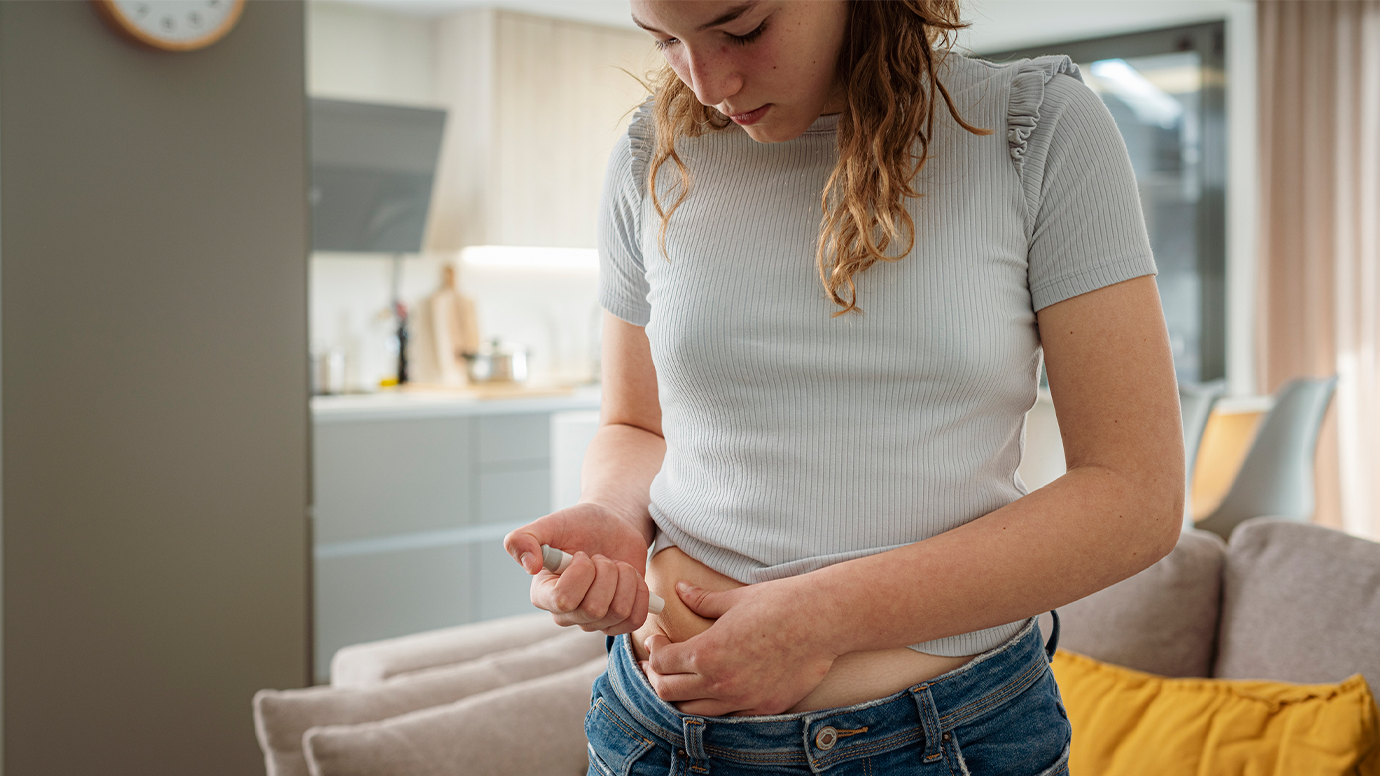The Holidays and Ketones: Stay Safe During a Stressful Season
Written by: Kourtney Johnson
6 minute read
November 25, 2025
The holiday season is a time to celebrate traditions with loved ones. But with the fun of the holidays can come stress, unfamiliar and high sugar foods, disrupted routines, and more time indoors, where shared and enclosed spaces lead to more shared germs.
While these factors can be difficult for anyone, adding diabetes management to the mix makes it even more challenging.
Those germs can lead to the increased possibility of developing an illness, such as the flu. These illnesses can lead to the development of ketones and—if not caught and treated early—diabetes ketoacidosis (DKA).
But with planning, proper prevention, ongoing glucose monitoring and regular ketone checks, you can help lower the likelihood that DKA and high ketone levels will crash the party.
If these conditions do develop, you can be prepared to know the signs of ketones and ways to monitor and manage them.
Tips to avoid ketones during the holidays
Ketones form when there isn’t enough insulin in the body.
Illness, scheduling changes that lead to irregular eating patterns, pump failures, missed insulin doses, expired insulin, and chaos that can lead to high stress are all risk factors.
To help you prevent rising ketones and DKA over the holidays, we checked in with Dr. Jennifer Sherr, Professor of Pediatrics (Endocrinology) at Yale School of Medicine and Dr. Francine Kaufman at The University of Southern California School of Medicine and Children’s Hospital Los Angeles.
Dr. Sherr and Dr. Kaufman stress the importance of these eight tips:
- Plan ahead. Consider how the upcoming weeks and months may introduce new things to diabetes management like a change in schedule, social events and food and beverages outside of your usual pattern.
- Remember the importance of ketone checks. Keep supplies to check for ketones—via a blood test or urine test strips—readily available. Remember to check expiration dates on strips!
If your glucose level is high for a prolonged period of time, or if you are feeling sick, always check for ketones, particularly if you are nauseated or have vomited. - Revisit your diabetic ketoacidosis (DKA) prevention and management plan. Be prepared for how to manage episodes of elevated ketones. Make sure you have a plan with your healthcare provider of how to clear ketones should they develop.
The absolute basics are following your healthcare provider’s instructions, adequate insulin (more than your usual doses) and to stay hydrated. If you are vomiting or you can’t keep fluids down, you might need to go to an emergency department for IV hydration and IV insulin. - Keep an eye out for the signs of elevated ketones. The holidays may mean a break from school or work, but keeping diabetes management strategies top of mind is critical. Be vigilant for signs of ketones.
Watch out for any signs of stomach pain, fatigue, nausea or vomiting. Even if you suspect the symptoms are related to a seasonal bug, flu or upset stomach from holiday treats, always check for ketones! - Check your ketone meter and strips. When was the last time you checked the expiration date of your urine and/or blood ketone strips? Take a look and make sure you have the inventory you need at your fingertips at home, in the car and in bags, totes and backpacks! Also be mindful of keeping urine test strips in humid places, as this can make them lose accuracy.
- Maintain healthy habits. The holidays should be enjoyed! But everyone needs to be mindful of how rich foods and sweets can impact them. For folks with diabetes, this may mean being aware of how some foods and beverages will impact glucose levels.
Remember to focus on healthy habits like drinking enough water and including vegetables and proteins in your main meals. Correct high glucose levels when they occur.
Be sure your insulin doesn’t freeze or get exposed to excess heat when you travel. Those hotel refrigerators are great but be sure they are not set too low!
Also, be sure you have adequate supplies with you of all your diabetes essentials. - Manage stress and anxiety. The uptick in social activities and a busy schedule can bring some anxiety into the season. It is important to remember the importance of sleep and methods to minimize stress.
Stress can impact glucose levels and may heighten the risk of elevated ketones and, potentially, an episode of DKA. - Watch out for germs. This time of year, there is an uptick of germs—everything from your common cold to the flu and the COVID-19 virus.
It is important to be hyper vigilant with washing hands and minimizing exposure to germs, as sickness can raise the risk for a DKA episode.
If you are sick, stay home and keep a close eye on ketones until you feel better.
When to check for ketones
You can never be too cautious when it comes to preventing and treating ketones.
It’s a great idea to check if:
- your blood sugar is above 240 mg/dL
- you’re experiencing symptoms such as stomach pain, nausea, vomiting, fever or other cold/flu symptoms
- you’ve skipped meals or have low appetite
- you’ve undergone unusual physical or emotional stress
- you use an SGLT-2 inhibitor medication (since it puts you at higher risk of developing ketones, even at normal blood sugar levels)
You can use a blood ketone meter or urine ketone strips to check for ketones.
What to do if you have elevated ketones
Check ketones regularly to monitor your levels.
Urine ketone results fall into different categories: mild, moderate and large.
Blood ketone results are the most accurate and provide specific amounts of ketones:
- 0.0-0.6 mmol/L are normal
- 0.6-1.5 mmol/L are mild but of concern
- 1.5-3.0 mmol/L are moderate and must be brought down
- >3.0 mmol/L are large and serious, indicating that DKA is likely.
Treatment varies depending on the level of ketones and glucose. However, drinking 8 ounces of water every 30 to 60 minutes to help flush ketones out of your system is generally recommended.
You will likely need more insulin when ketones are elevated. If your healthcare team has not given you an insulin dosing plan for ketones, contact them to see what they recommend.
If you have vomited even once, you are unable to keep fluids down or ketone levels don’t decrease, seek medical attention.
Remember to enjoy the season
The holidays are a wonderful time of year filled with fun and celebrations. However, they present unique challenges for people with diabetes.
Proactive planning, checking for ketones and responding appropriately will help you stay safe and healthy this holiday season!
To learn more about ketones and DKA, visit RisingKetones.com.
This content was made possible by Abbott Diabetes Care, an active partner of Beyond Type 1. Beyond Type 1 maintains editorial control over its content.
Related Resources

During the week of October 14, 2025, California became the 29th U.S. state to pass...
Read more

Starting in January 2026, Civica Rx, a nonprofit drug manufacturing company, will launch its affordable...
Read more

When you live with diabetes and are sick with the flu or a virus, a...
Read more


